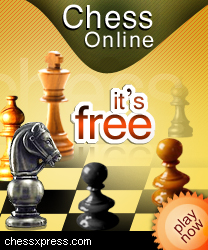Guest Post by Paul
The most interesting and challenging part in the fascinating game of chess is the middle game. It is this part of the game that would witness the real battle between the minds of two players of same capability. Ironically, it is this part of the game for which there is not much literature or straight-forward short-cut formula that one can adopt. With constant practice, however, one can gain experience and expertise in the middle game strategies. Using online chess or playing chess using the computer and the Internet in online chess websites is one of the best ways to learn the game and also gain expertise in a relatively quicker time.
What is the middle game? Where it starts and where it ends? There is no concise answer for these questions. One can say that the middle game starts when the opening game ends and the middle game ends when the end game starts. This seems to be vague, but, in most cases, it is sadly true because there is very thin line of difference and there is not much clarity.
Typically, the opening game should come to an end in less than 12 moves by which a player is reasonably expected to have developed his pieces and taken positions. But that seldom happens in the game and there is no set rigid rule that signals the beginning of the middle game.
The middle game is the real battlefield in the game where one is expected to use all his knowledge and thinking capability to the maximum extent. It is a minefield full of tactics and strategies.
To have a better and challenging middle game, it is imperative that you have a good opening game where the major pieces are well developed, the king is in a safe and secure place, and there is enough scope for free movement of the pieces. If there is some inherent weakness in the opening game, then it is unlikely that you can have better control over the middle game.
I would like to share with you some of the tips that would be of help to you in approaching the game with confidence.
In majority of cases, the opening game follows some of the time-tested and proven opening theories or opening variations such as French Defense, Roy Lopez opening, King’s gambit, Caro-Kann etc., Many people would have memorized the first few moves of each variation and can move the pieces to appropriate square, with no second thought, in a flash. But this can be followed only for the opening part. Once you enter into the middle game stage, you should start thinking a bit more deeply and concentrate more on the positional advantages of the various pieces.
You need to think not about the materials on hand, but also the positional advantages of the pieces. For example, if you have your queen side bishop at c1 and the king pawn in e2 moved to e3. If there is also a pawn at b2, then your white bishop is cramped as it can move only to d2 square and nothing more can it do. Thus not just the material but also the position of the pieces and their merits and drawbacks relative to the position should be assessed and analyzed, so that you can chalk out your plans well.
Before zeroing on a particular move, you should, for a split second, place yourself in opponent’s shoes and see what type of response can he give to your moves. This analysis and consequences of the opponent’s response should also be analyzed and then proceed with your decided move.
You should also use the analytical ability and foresight for planning your next 2 or 3 moves. Having planned for the next couple of moves, you can proceed further in the middle game with confidence. However, you should always bear in mind that a plan should not be a rigid one. The success or failure of your next planned move is dependent not on your plan but mainly on the response from the opponent’s move in his turn. If he foils your plan or makes a counter attack, you have no other option but to put your present plan to the back-burner and start working on a new plan. This does not mean that you should cease from planning your moves. By careful planning, you will get a better perspective of the game, which is essential for deploying tactics and strategies.


